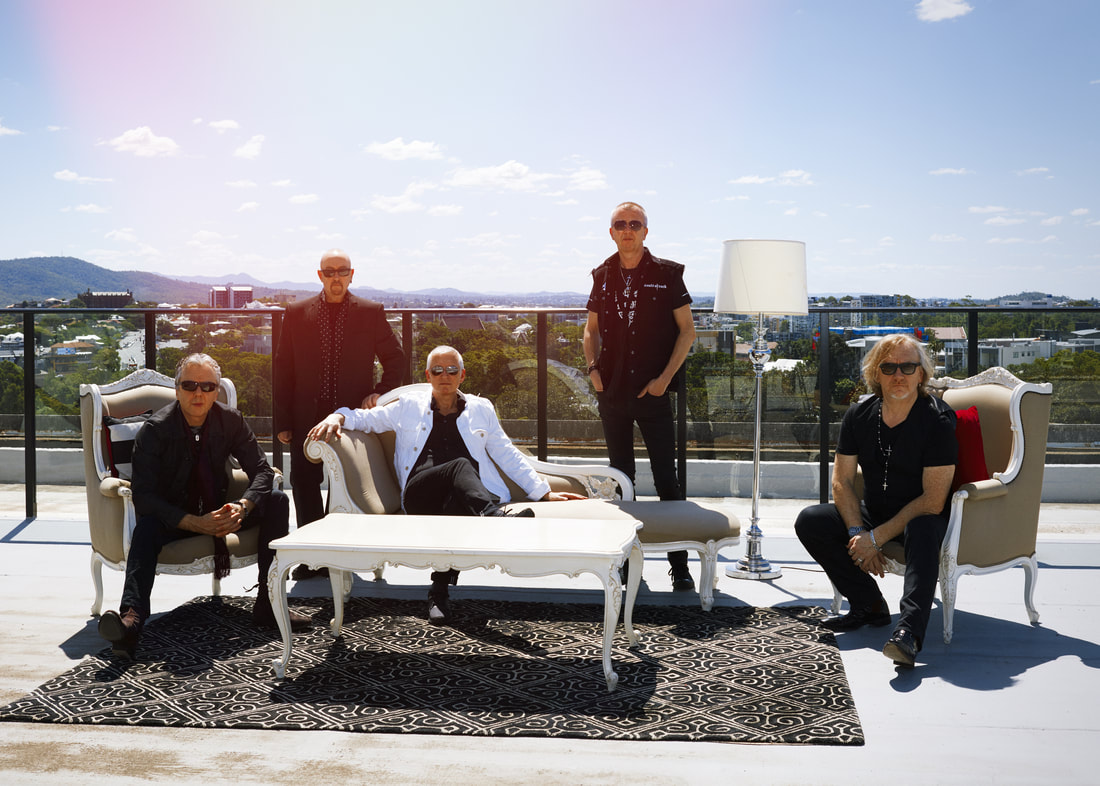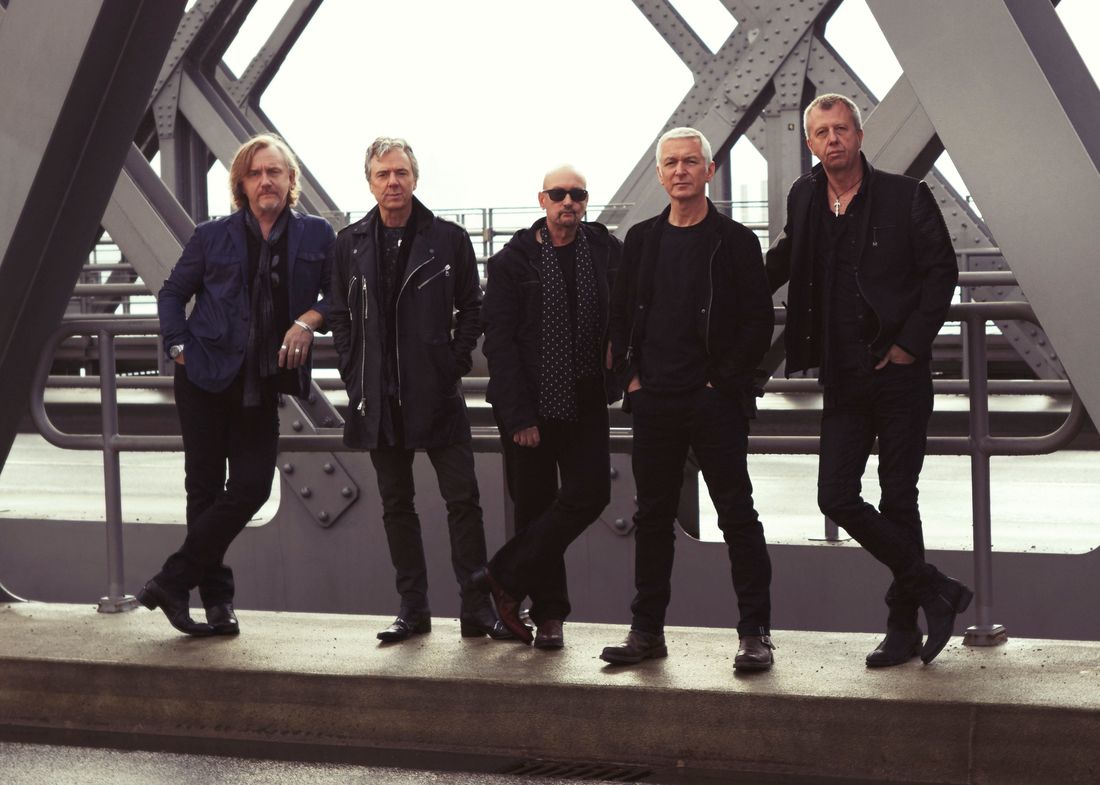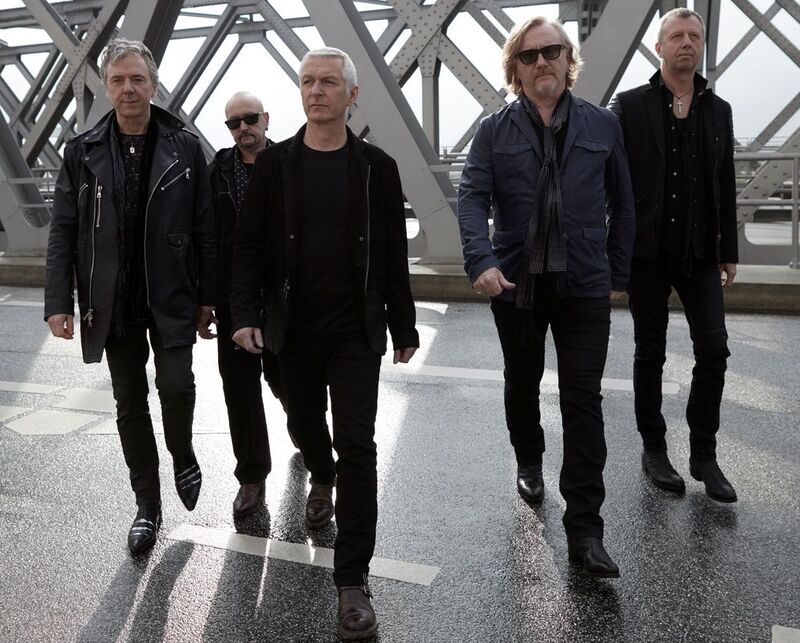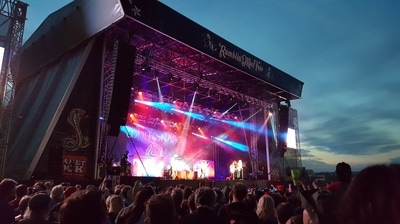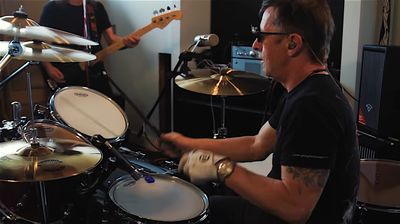|
Celebrating three decades together, Thunder have just released their first ever band sanctioned, career-spanning retrospective; ‘The Greatest Hits’. With eleven studio albums and countless live shows behind them, it’s a good time to take stock on the highs, as well as the lows. We sat down with front man Danny Bowes for an in depth chat about the London band’s creation, early years and rise, as well as the bumps along the way. Living for today; Eamon O’Neill.
Hi Danny how are you today?
I’m pretty good, yeah. I’m a bit jet lagged after visiting America. We do a charity motorcycle ride pretty much every year either in America or Canada, and we raise a bunch of money to give to Childline / NSPCC. This is probably our biggest ride to date, so I’m about as sharp as I can be under the circumstances! You’re promoting ‘The Greatest Hits’, so I wanted to go back to the very beginning of Thunder, which starts with the end of Terraplane; when did you realise that Terraplane wasn’t working anymore? I think probably while we were making the second album [‘Moving Target’, 1987]. We kind of realised that we’d lost our way, and that we believed all the stuff - I think that’s the politest way to put it – that our record company and our manager had told us. You’ve got to remember, we’d waited a long time to get our record deal, and we’d been turned down by every record company more than once, so when we signed to Epic, that was a really big deal to us; a major label with major artists on it, and we kind of assumed that they knew what they were talking about. If I was going to write a book now about all the mistakes you could make in a record company, that would probably be on page 1. So the record company were giving the band bad advice? Don’t assume because they’re the record company that they know what they’re talking about, because that would be a grave error. And that’s what happened. So, we were making the second album, and everything had changed. They’d kind of coerced us into making a whole bunch of decisions on songs, on a producer, on arrangements, and because we’re basically reasonable people, we kind of assumed that it was the right thing to do. It was only when we were making the record that we realised that suddenly all the guitars had gone, and it was all very keyboard-mongous, and we thought; “what have we done here?!” By which time, it’s too late; the record company’s spent the money, the album’s coming. It gets released, and guess what? Nobody cares. So that experience with Terraplane’s second album cemented your need for a major change? At that point we realised that we needed to do something about it, and I seem to remember having a conversation with out head of A&R, and that was really when it came home and kicked me right up the trousers. I sat with Muff Winwood, who was a legendary producer, A&R man, Spencer Davis Group, after we’d made the album, and we’d cut all our hair off because the record company said it was a good idea as well, and I said to him; “we just need to get back to making a rock record, Muff, because we’re a rock band”, and he said; “yeah, absolutely”, and then there was a pause, and he said; “you might need to grow your hair”, and it was all I could do to not jump across the table and strangle him. In the end I just sort of bit my lip and I said; “Muff, it’s growing as we speak” Going into Thunder, did you have an idea of what exactly you wanted the band to be?
Well, I think Thunder was the band that Terraplane always should have been, and never really got a chance to be. Once Terraplane was over and we’d closed the door, Luke and I went to America. We knew a lot of people in America, so in need of inspiration, we arranged a whole bunch of meetings. In retrospect, I can’t understand why anybody took those meetings with us, because we were just like these idiots off the street asking them how it worked. To our surprise, we took a whole lot of meetings with a bunch of people who were really powerful and knew their onions, and they basically just told us you need to follow your heart and make the right kind of record that suits you. So did that advice inspire you? Yes, and we kind of took that away, and we cruised up and down Sunset Strip, and we saw all these hair bands, and a lot of them were having a lot of success, but they weren’t actually very good. And I can remember there was this dawning realisation where we just set there in a bar, drunk, and I said to Luke [Morley, guitarist, song writer]; “we can do this better than these”, and he said; “yeah, I think we can, we just need to make the right record”. He already had some songs; ‘Dirty Love’ was written, and we’d just met Andy Taylor [Duran Duran guitarist and producer of ‘Backstreet Symphony’]. Andy Taylor seemed to have been a key player in the band’s early years, and in the creation of debut album ‘Backstreet Symphony’ [1990]. Oh, massive. We met him while we were demoing, before we even were Thunder. We’d just started demoing again after we’d got back from America, and he came into the sessions, and every time we said; “hmm, maybe not”, he’d say; “no, do it. Turn it up. Do it louder. Scream a bit more”; he just encouraged us. It was almost like he was our attitude manager. And of course he was instrumental in making sure that the environment was right for us to make the kind of record that we made. We owe him a huge debt, because we had been kicked about so much and we were so confused after the Terraplane incident, and he came along at exactly the right time. So that’s when Thunder really began to take shape? With him managing the attitude, and the band generally being just a little bit pissed off about what had gone on before, we were in no mood to be mucked about. So the name came along; big, loud, simple; that’ll work for us, that’s what we want to achieve in terms of music, and so, Thunder just came about very organically, and the more aggressive we were about the whole thing, the more attitude we had about the whole thing, the more it seemed to work. So it was about all of these factors coming together and it all just manifested itself in a band with a lot of attitude, and a whole bunch of really heavy duty riffs. ‘Backstreet Symphony’ was a huge success; was it gratifying to have finally made it? Well, our experience with Terraplane had taught us that we didn’t really want to feel like that. We were having a really nice time; don’t get me wrong, we’d waited a long time to get some success, and when we got some, we thoroughly enjoyed it, probably more than we should have; there was certainly some pain and suffering involved! But, at the same time we were very careful to not celebrate too much. We didn’t really want to rest on our laurels, we didn’t really want to take it for granted, and to be honest with you, 30 years later, we still don’t. We’re very hard on ourselves when it comes to the music; we want to make sure we put in the best live performances; we want to make sure the records are as good as they can be, because we’re very mindful of the fact that we came from a place where we had an opportunity, and to a greater or lesser extent, we screwed it up. We don’t ever want that to happen again, so we’re super careful. You followed up your debut with ‘Laughing On Judgement Day’ in 1991, which was another big success.
We were still very much high on life. It was what they might call in inverted comas ‘the difficult second album’, after the first album had done very well, but we weren’t very conscious of the pressure. Luke had written a whole bunch of tunes, and if I have a criticism of that album, it’s that I think it’s too long. Everybody was very excited about CDs and the fact that you could get 74 minutes on it, and I can remember the conversation along the lines of; “well if we can, why don’t we?” And in hindsight, I think the album’s probably three of four songs too long. But, judgement is easy afterwards. Andy Taylor returned once again to co-produce. We had a great time making the record, but we kind of fell out with Andy Taylor halfway through making it. He, at the time was very busy; he’d bought a night club and he was very engaged with that, and a lot of the time he wasn’t really taking notice of the album, so I think by the time we’d finished recording a lot of it, we’d had enough. So we parted company with him, and we just didn’t ask him to come back for the last bit. So Luke finished it off, and it was great. It was a really enjoyable album to make, despite the break-up with Taylor. The tunes were cracking, and obviously some of those tunes are still big with us today, and they’re on the Greatest Hits. ‘Behind Closed Doors’, which followed in 1995, was a much darker Thunder record. We’d been through a degree of up and down. We’d signed to Geffen in America, and we went backwards and forwards on the third album trying to get Geffen excited about it, but by then the whole Grunge thing had kicked in, and it became very apparent towards the end of that period. We made the record in America to be near to them so hopefully they’d be excited, but it was clear that radio had changed pretty much overnight in ’92, and there was no coming back from that. They weren’t playing bands like us. It didn’t stop us trying, but we had to admit defeat in the end. So I think maybe the reason that album was so dark was because maybe Luke was feeling the pinch as to what was going on. That was around the time of the infamous ‘Coverdale-gate’ story, which claimed Luke was leaving the band to join Whitesnake; was that really just a publicity stunt? Yeah, it was a joke. Yeah, there had been some sort of mutterings. David Coverdale had asked him if he would, I think it was write a song or something, and Luke was too busy and he said no, and then our press person at the record label jumped all over it and got very excited about it; “this would be amazing; let’s make a thing out of it!” I mean, I don’t really give a rat’s ass about any of that kind of thing, but they almost accuse you of not wanting to help your career. So, you have to go along with stuff sometimes. EMI were brilliant for us for about the first six years, they were absolutely fantastic, and they pushed buttons, spent money, so when they got excited about that, we joined in. Click here to read Luke Morley’s version of events. ‘The Thrill of it All’, released in 1996, was a much more upbeat affair.
By then we were off EMI, we were off Geffen, so a lot of that kind of baggage and that kind of misery that we were carrying around went away. We’d lost a couple of bass players at that point; we’d lost Snake in ’92, and Mikael [Höglund] after the ‘Behind Closed Doors’ album, so we ended up making the album without a bass player. There was just the four of us, and we went to Rockfield [studios, Wales] for the first time, so we sat there for the first six weeks just laughing our heads off! We had a new record deal, plenty of money in the bank, and there were only four of us to drink heavily, so it meant we had more money to spend on ourselves. It meant we were able to have a really good time, so I think that’s probably why the album has that kind of positive reflection, and we certainly really enjoyed making it. You’ve been back to Rockfield to record since then, haven’t you? Since we came back to do the ‘Wonder Days’ album [in 2015], the last three albums have been made at Rockfield, and we hadn’t been there for 20 years. We’ve got some of that feel back now. ‘Giving The Game Away’ came next in 1999, and it was a very different introspective album for Thunder. Yeah. I think, by then, the media rot, as one would call it, was very much in. It was almost impossible for us to get anything written about us, and when they did, it was fairly sneering; “good old reliable Thunder, still going, but just doing the same old stuff”. I’d realised that the press are the press, and they write about the stuff that’s current, and if you’ve got something written about you and it’s slightly negative, you have to take it as a positive because at least it’s something being written. So I didn’t get too down about it, but I know some of the other guys were fed up about it, and I know Luke especially. There are some songs on that ‘Giving The Game Away’ album that I think are some of our best songs. But I think that maybe the experience of writing the album wasn’t the best for him. Maybe that just shows up; it’s a reflection of where you’re at. With such a large catalogue, was it difficult choosing the track listing for ‘The Greatest Hits’?
If it had of been down to the band to choose their own favourites, we’d still be arguing about it now. We decided that the best way to do it would be to ask the record company to make their list, and that was no good, so Luke basically sat down and made a list, and then we all chipped in with his. You’re looking at the ones that are firm fan favourites, and ones that you think best represent the band, and the albums that we made. What we’re very pleased about is there’s at least one song from every studio album, and that’s the first time that’s been done. We’ve had a few labels over the years, and when we did the deal for this album with BMG, I said; “that means you’ve got to talk to everybody, and if you want to do that, then we’d be more than happy for that to happen”. Did your particular favourites make the cut? It very difficult to choose the tunes because they become part of you. When you sing and play them hundreds and hundreds of times, they take on a very different meaning. You don’t listen to them for pleasure; you just kind of live them. So it’s very hard. Choosing one over another; you’re almost denying that the other one’s as good as the one before, and I find that really difficult to do. In that case, it’s not surprising that you haven’t opted to perform any of your albums in their entirety live, thus far; would that interest you at all? Well, I think it’s clear to me that an album is an album, and a show is a show, and there are always going to be songs on an album that wouldn’t necessarily work live. So the idea of playing a whole album in its entirety is not appealing. The reason is because I think the show would suffer as a result. I’ve been to see some of these type shows, and when they play the songs that are not as good live, it’s really evident, and you can see the audience all rushing to the toilet or the bar. We pride ourselves in our live shows, and because we build in a beginning, a middle and an end, we want to make sure everybody goes away completely and utterly destroyed; if they’re not as exhausted as me, then I’ve failed. So, I have to know that the show’s going to have all of those ingredients, and I don’t think you’d get that if you played an album in its’ entirety. That said, we have been discussing it recently because it’s been mentioned to us a few times. We’re not going to do it in the immediate future, don’t get me wrong, but we’re thinking maybe we could possibly combine a couple of albums and do all the best tunes. So, we could maybe do something like that and then slip a couple of bangers in there, just to turn into a show. But if we made it principally about the best of two albums, that, to us, might work. I mean, it’s still in the early stages of discussion, so don’t expect an announcement imminently! So what’s next for Thunder? What I can tell you right now is we’re making a new record. We’ve already started it, and in the same way we’ve made the last three albums, rather than go into the studio for x amount of weeks and come out with a finished album, what we do now is we book short sessions. We go into the studio with way too many songs, and then we do them at a breakneck pace, so that by the time we leave there we’ve got as many done as possible. Then, we step away from it, Luke writes some more tunes, and then we go back into the studio and we do it again. That usually involves two or three sessions. It’s fairly intense, and we enjoy the process, and we get better albums as a result. So, we’ve done one session, we’ve got another one coming up, and then there’ll be another one early next year, if we’re not finished. Have you any idea of when the next album will see the light of day? I reckon the album will be out the back end of next year. There’ll be a tour to go with it, and if everything goes the way I’d like it to go, we’ll be in the position to announce that tour within the next couple of months. Finally, there have been a couple of periods when Thunder didn’t exist; you must have been approached by some big names with a view to working together? Yeah, loads of times, and it’s never come off for various reasons. Obviously we’ve had two times two years off; what I call the ‘blue’ periods when we decided we were splitting up. In both instances there were different reasons behind it, and we were deadly serious both times. And I can remember during the first one [2000 – 2002] I got a call from somebody who shall remain nameless about somebody who is absolutely one of my big heroes, who enquired as to whether or not I would be up for the idea of forming a band with them, and at that point my tongue fell out and I was very, very excited about it. Unfortunately, said individual then got distracted with something else, and it never came to anything. But I don’t know whether or not it ever would have. For me, it would have been a real thrill, but it never came off. Like this interview? Like us on FaceBook and follow us on Twitter for regular updates & more of the same. Thunder's 'The Greatest Hits' is out now. Click here for exclusive editions direct from Thunder. |
|
Thunder
"The tunes become part of you. When you sing and play them hundreds of times, they take on a very different meaning." - Danny Bowes.
© 2016 - 2024 eonmusic.co.ukContact: [email protected]
|

